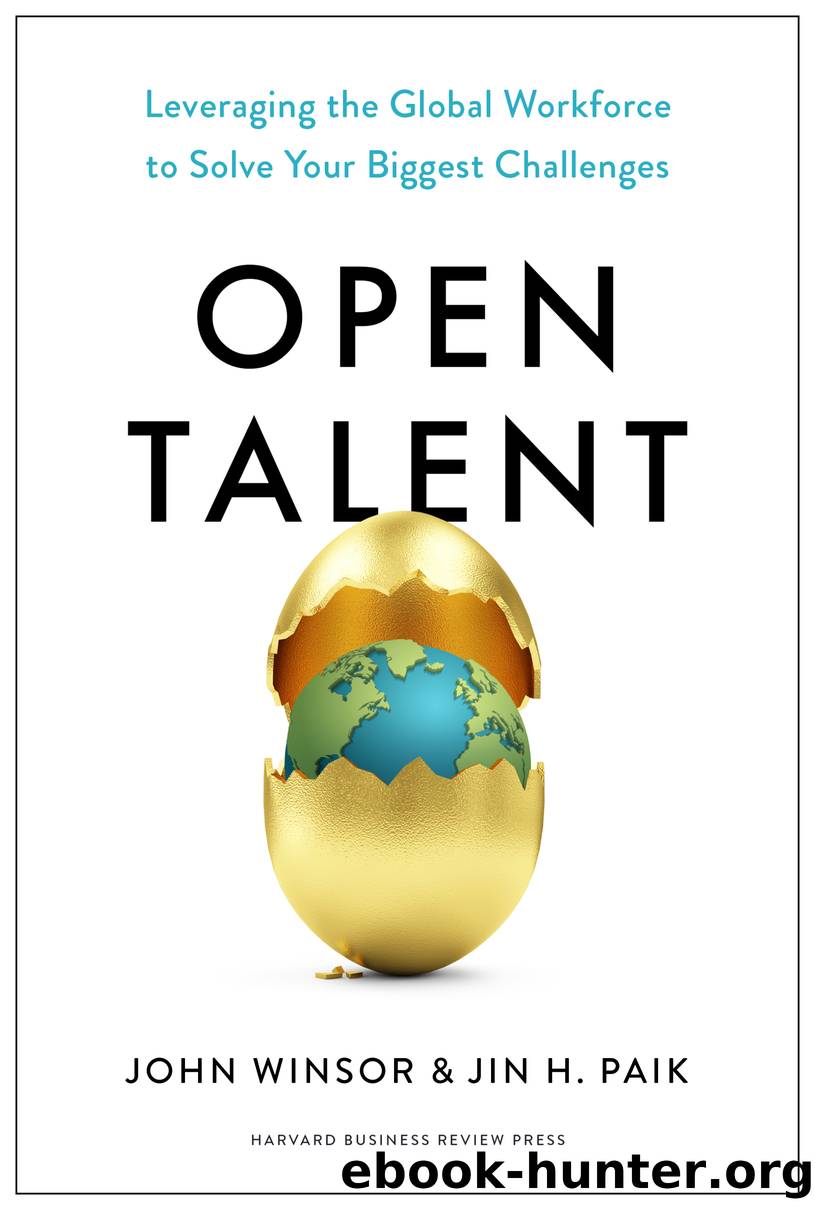Open Talent by John Winsor

Author:John Winsor
Language: eng
Format: epub
Publisher: Harvard Business Review Press
Published: 2024-01-16T00:00:00+00:00
The Future of External Talent Clouds
Building an ETC is just beginning to be understood by most organizations and, like so many other technology-based transformations, open talent and ETCs continue to morph and grow on a monthly basis. We briefly described Braintrust and Turing earlier in this chapter. While Upwork, Toptal, and Freelancer.com still dominate the market for digital talent clouds, they are version 1.0. With their reliance on AI and Web 3.0, Braintrust and Turing are version 2.0.
Weâre in a shift with the internet. In the original Web 1.0 paradigm, information flowed in one direction, from sites to users, and it was static. Think of the old landing pages where people only received published information but had little interaction. In Web 2.0, information started to become bidirectional. Users interacted with apps, feeding them data (uploading photos, creating content, sharing, etc.). The downside to Web 2.0 is that the dream of a democratized web was quickly overwhelmed by a few global platformsâGoogle, Apple, Facebook, Amazonâthat not only devastated traditional media and brick-and-mortar retail, but also upended our collective property rights. For example, under its current terms and conditions, Facebook can grant free licensing on pictures posted without getting further consent than what you agreed to as you joined the platform. Thatâs a steep price to pay for access.
Decentralized autonomous organizations, or DAOs, are a new way to finance projects, govern communities, and share value. Instead of a top-down hierarchical structure, they use Web3 technology and rapidly evolving governance and incentive systems to distribute decision-making authority and financial rewards.
Braintrust, which operates as a Web3-based DAO that runs on the Ethereum blockchain, was started by Adam Jackson and Gabriel Luna-Ostaseski in 2018 to disrupt the open talent economy by giving more control and greater rewards to freelancers. It has launched a token or an incentive for participating in a decentralized network as part of a reward system called BTRST, which in time will allow its users rather than a central corporation to become its owners.
If we look at early versions of talent processes that create friction and inequities, Uber is the poster child for these disparities of rewards in the gig economy marketplace. If you invested $1 million in the first round of venture funding in Uber, your stock would have been worth $25 million when it went public nine years later. At the same time, Uber drivers continue to make minimum wage.
Braintrust represents a new model, ensuring that everyone benefits from the success of the platform. The company has kept its core team small, with only thirty-five employees, while its network is powered by more than seven hundred thousand community members who earn tokens for recruiting new members and clients, as well as perks and privileges. Thanks to its Web3 DAO-based business model, Braintrust can reduce costs for both sides of the market, eliminating talentâs fees altogether and reducing clientsâ fees by as much as 50 to 75 percent compared to other platforms. Time will tell if Braintrust and blockchain will own the future.
Download
This site does not store any files on its server. We only index and link to content provided by other sites. Please contact the content providers to delete copyright contents if any and email us, we'll remove relevant links or contents immediately.
| Conflict Resolution & Mediation | Human Resources & Personnel Management |
| Knowledge Capital | Outsourcing |
Bullshit Jobs by David Graeber(3190)
Radical Candor by Kim Scott(2225)
I Am Right, You Are Wrong by Edward De Bono(2109)
23:27 by H. L. Roberts(1895)
Nomadland by Jessica Bruder(1689)
Average Is Over by Tyler Cowen(1542)
High-Impact Interview Questions by Victoria A. Hoevemeyer(1403)
Out of Our Minds: Learning to Be Creative by Ken Robinson(1382)
The Conflict Resolution Phrase Book by Barbara Mitchell & Cornelia Gamlem(1348)
The Ideal Team Player by Patrick M. Lencioni(1317)
An Everyone Culture: Becoming a Deliberately Developmental Organization by Robert Kegan & Lisa Laskow Lahey(1296)
The Asshole Survival Guide by Robert I. Sutton(1285)
Automatic Society by Bernard Stiegler(1224)
Unleashed by Anne Morriss & Frances Frei(1222)
Who by Street Randy & Smart Geoff(1201)
42 Rules of Employee Engagement by Susan Stamm(1192)
Who Moved My Cheese?: An Amazing Way to Deal With Change in Your Work and in Your Life by Johnson Spencer(1180)
96 Great Interview Questions to Ask Before You Hire by Paul Falcone(1134)
The Power of Disability by Al Etmanski(1083)
